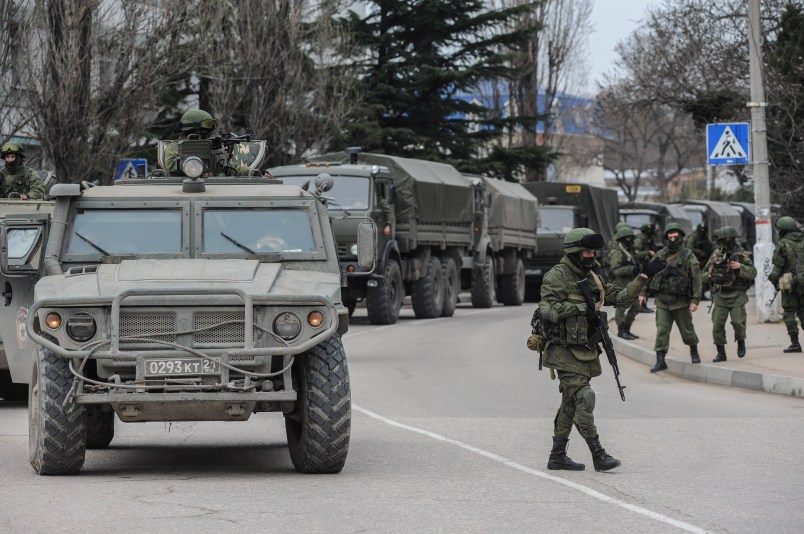KIEV, Ukraine (AP) — Britain’s foreign secretary said the U.K. is not discussing military options in its attempts to reverse the Russian incursion into Ukraine but insisted that Moscow must face “significant costs” over its moves in Ukraine’s Crimean peninsula that its troops now control.
Pro-Russian soldiers seemed to further cement their control over the strategic region — that also houses the Russian Black Sea Fleet — by seizing a ferry terminal in the Ukrainian city of Kerch about 20 kilometers (12 miles) by boat to Russia, intensifying fears that Moscow will send even more troops into the peninsula. It comes as the U.S. and European governments are trying to figure out ways to halt and reverse the Russian incursion.
The soldiers at the terminal refused to identify themselves on Monday, but they spoke Russian and the vehicles transporting them had Russian license plates.
Russia has taken effective control of the Crimean peninsula without firing a shot. Now, the fears in the Ukrainian capital and beyond are that that Russia might seek to expand its control by seizing other parts of eastern Ukraine. Senior Obama administration officials said the U.S. now believes that Russia has complete operational control of Crimea, a pro-Russian area of the country, and has more than 6,000 troops in the region.
So far, Ukraine’s new government and the West have appeared powerless to counter Russia’s tactics.
Ukrainian Prime Minister Arseniy Yatsenyuk insisted that Crimea remains Ukrainian territory despite the presence of Russian military.
“Any attempt of Russia to grab Crimea will have no success at all. Give us some time,” he said at a news conference with British Foreign Secretary Wiliam Hague, who is visiting Kiev.
“For today, no military options (are) on the table,” he said, adding that what they urgently need is an economic and political support.
“Real support. Tangible support. And we do believe that our Western partners will provide this support,” he said.
Hague said “the world cannot just allow this to happen.” But he ruled out any military action.
“The U.K is not discussing military options. Our concentration is on diplomatic and economic pressure.”
Russian Foreign Minister Sergey Lavrov on Monday justified the use of Russian troops in Ukraine as a necessary protection for his country’s citizens living there.
“This is a question of defending our citizens and compatriots, ensuring human rights, especially the right to life,” Lavrov said in Geneva.
Tension between Ukraine and Moscow rose sharply after Ukraine’s pro-Russian President Viktor Yanukovych was pushed out by a protest movement among people who wanted closer ties with the European Union. Yanukovych fled to Russia after more than 80 demonstrators were killed near Kiev’s central square. He says he is still president. Since then, troops that Ukraine says are Russian soldiers have moved into Crimea, patrolling airports, smashing equipment at an airbase and besieging Ukrainian military installations.
Outrage over Russia’s military moves has mounted in world capitals, with U.S. Secretary of State John Kerry calling on President Vladimir Putin to pull back from “an incredible act of aggression.” Kerry is to travel to Ukraine on Tuesday.
Hague said it was urgent to get Russia and Ukraine “in direct communication with each other.”
Hague said on the BBC that Moscow would face “significant costs” for taking control of Crimea.
“If Russia continues on this course we have to be clear this is not an acceptable way to conduct international relations,” Hague said. “There are things that we can do about it and must do about it.”
Putin has defied calls from the West to pull back his troops, insisting that Russia has a right to protect its interests and those of Russian-speakers in Crimea and elsewhere in Ukraine. His confidence is matched by the knowledge that Ukraine’s 46 million people have divided loyalties. While much of western Ukraine wants closer ties with the 28-nation European Union, its eastern and southern regions like Crimea look to Russia for support.
Faced with the Russian threat, Ukraine’s new government has moved to consolidate its authority, naming new regional governors in the pro-Russia east, enlisting the support of the country’s wealthy businessmen and dismissing the head of the country’s navy after he declared allegiance to the pro-Russian government in Crimea.
NATO held an emergency meeting in Brussels and the U.S., France and Britain debated the possibility of boycotting the next Group of Eight economic summit, to be held in June in Sochi, the host of Russia’s successful Winter Olympics. On Sunday evening, the White House issued a joint statement on behalf of the Group of Seven saying they are suspending participation in the planning for the upcoming summit because Russia’s advances in the Ukraine violate the “principles and values” on which the G-7 and G-8 operate.
Russia has long wanted to reclaim the lush Crimean Peninsula, part of its territory until 1954. Russia’s Black Sea Fleet pays Ukraine millions annually to be stationed at the Crimean port of Sevastopol and nearly 60 percent of Crimea’s residents identify themselves as Russian.
___
Bennet reported from Kerch, Ukraine. Danica Kirka in London contributed to this report.






